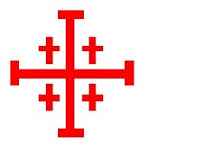
When have Christian people been without war? The very word “peace,” “shalom” does not mean placidity, but a peace that comes through victory. “I will give peace in the land . . . you shall chase your enemies . . . five of you shall chase a hundred” (Leviticus 25:6-8). It is not for nothing that Paul bids us “put on the whole armour of God’ (Ephesians 6:11). It is not an empty metaphor. For centuries back in my own heritage it has always been so: “Our minds must be stronger, our hearts braver, our courage higher . . . who ever longs to run from this field will always regret it” (The Battle of Maldon, trans Burton Raffel). The flock of the Good Shepherd is a holy warband organized and armed for war.
In a letter to Mary Van Deusen (February 22, 1954) C. S. Lewis remarks, “If only people (including myself: I also have fears) were still brought up with the idea that life is a battle where death and wounds await us at every moment, so that courage is the first and most necessary of virtues, things wd. be easier. As it is, fears are all the harder to combat because they disappoint expectations based on modern poppycock in which unbroken security is regarded as somehow ‘normal’ and the touch of reality is anomalous.”
The author of Hebrews exhorts us, “Consider Him who endured such hostility against Himself, so that you may not grow weary or faint hearted . . . it is for discipline (paideias – training) that you have to endure. God is treating you as sons . . . He disciplines us for our good, that we may share His holiness . . . therefore lift your drooping hands and strengthen your weak knees, and make straight paths for your feet, so that what is lame may not be put out of joint but rather be healed” (Hebrews 12:3,7,10b,12). Victorious Christianity is not for the faint hearted but for men and women of courage who will not shrink from the battle.
Part of the shock we are discovering in the Anglican Communion today is precisely that. We are in a pitched battle and our fears are magnified by an unbiblical expectation of some abiding ethereal peace. But only cows are placid, which may be why they are so often offered on the sacrificial altar mooing in alarm, “This isn’t fair! I wanted peace, not war.” We are called to join Gideon’s army of three hundred where only the alert, watchful, and brave are truly fit for war (Judges 7).
We have forgotten that “The weapons of our warfare are not carnal (sarkikos – fleshly) but have divine power to destroy strongholds.” The words are carefully chosen. The weapons, word, sacraments, and charisms are not limited by the flesh, but have divine power . . . are powerful through God for the overthrowing of strongholds” (II Corinthians 10:4). We are dealing with strongholds of the strongman who needs to be bound by the authoritative declaration of the Word. “No one can enter the strongman’s house and plunder his goods, unless he first binds the strongman, then indeed he may plunder his house” (Mark 3:21). There is here a call for spiritual warfare, for the exercise of charisms, for “binding the strongman” by a verbal exercise of that binding, “in the name of Jesus, be silent and come out!”
We skirt the issue and find polite non-offensive ways to dance around the issue, anything rather than appear gauche. This is not a time for games, but a time for clear authority. The second and primary application of this text is the authoritative proclamation of the Word, the Logos, the Word of Truth in the situations that we face. By the proclamation of the Logos “we destroy arguments and every lofty opinion raised against the knowledge of God” (II Corinthians 10:5). The truth is here absolutely essential. We fasten it around our waist as a belt, a girdle of truth, and it holds the rest of the armour together.
What is hidden we must proclaim from the rooftops. Not dealing openly with the threats to Anglican identity, by attempting to avoid the covenant that could bind us together; keeping secrets about the moral corruption we face is very destructive to the Body of Christ. By allowing ourselves or others to hide behind false courtesy, we aid the work of the strongman by protecting his stronghold. It must not be. Declare the truth. “Speaking the truth in love we are to grow up in every way into Him who is the head, into Christ” (Ephesians 4:15). That is the only way we can deal with “human cunning in deceitful schemes” (Ephesians 4:14).

